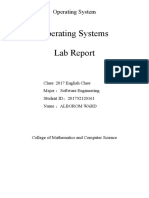0% found this document useful (0 votes)
11 views21 pagesOS Lab File
The document contains a series of experiments demonstrating various programming tasks in Shell and C. These tasks include checking if a number is even or odd, swapping integers, calculating factorials, generating Fibonacci series, and implementing process management with system calls. Additionally, it covers CPU scheduling algorithms and synchronization problems like the Producer-Consumer and Dining Philosopher problems using semaphores.
Uploaded by
halaplay385Copyright
© © All Rights Reserved
We take content rights seriously. If you suspect this is your content, claim it here.
Available Formats
Download as PDF, TXT or read online on Scribd
0% found this document useful (0 votes)
11 views21 pagesOS Lab File
The document contains a series of experiments demonstrating various programming tasks in Shell and C. These tasks include checking if a number is even or odd, swapping integers, calculating factorials, generating Fibonacci series, and implementing process management with system calls. Additionally, it covers CPU scheduling algorithms and synchronization problems like the Producer-Consumer and Dining Philosopher problems using semaphores.
Uploaded by
halaplay385Copyright
© © All Rights Reserved
We take content rights seriously. If you suspect this is your content, claim it here.
Available Formats
Download as PDF, TXT or read online on Scribd
/ 21






























































































